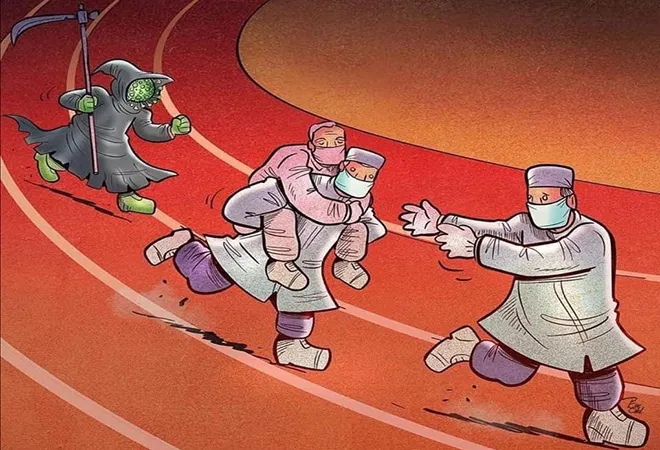
Social distancing as a ‘buy some time’ intervention to slow down the spread of Coronavirus in most countries while in other countries the counter reaction is building up. We can run but the specter of our past will keep haunting us.
The Coronavirus pandemic is a relay race against time and we appreciate that we are as strong as our weakest - the men and women whose daily life before COVID-19 was a struggle to remain alive; living from hand to mouth; no health insurance and struggling to get the basics of life. This is the population to watch out for as we strive to bring down the curve. A majority of this population resides in the developing countries.
There is an ongoing research all over the world, studying the spread and effect of this novel virus. The recent studies confirm the mode of transmission for the Coronavirus, primarily via respiratory droplets.
Spreading through close contact or touching one’s face after touching objects contaminated by droplets, but this does not explain all cases. A significant number of individuals are asymptomatic (lack symptoms) and are unknowingly spreading the virus during their interactions. Therefore, minimizing movement and contact between people as part of the WHO measures will greatly contribute to slowing down the virus if its implementation is tailor-made.
Social distancing even though it is enshrined in the international health regulations (2005), it remains a new phenomenon to social beings like humans. The challenges in its implementation have been immense in the non-industrialized economies, especially in the laboring class who depend on their daily wages to put food on the table for their families. This group has seen worse days, risking everything everyday including their life. They have made peace living with diseases so much so that their greatest fear is starvation. Social distancing by staying at home is not an option for them, particularly in the absence of proper social security programs and measures in low resource setups.
In the informal settlements, the fight against COVID-19 is a race against their livelihood, and therefore social distancing by staying at home might prevent people from working without achieving distancing. Socializing is unavoidable in small, poorly ventilated houses with shared washrooms and narrow streets. Despite previous epidemics and pandemics, lessons learnt were quickly forgotten but they continue to haunt us. Household detritus, poop and carcasses are still being thrown into the streets; sewage contaminates streams and sewage farms feeds a significant population. This poses a great challenge towards the fight and efforts against infectious diseases in general and most recently COVID - 19.
While social distancing remains a challenge in most of the developing countries, awareness and implementation must be contextualized otherwise it remains as ‘imperialistic’ as it sounds and will be viewed by the common man as a tool to serve the vested interests of the political class, the international organizations, or the foreign policies of the developed countries. Might this be the case with COVID -19? What is social distancing to a woman who has to walk many kilometers to wash laundry in homes, or sell her wares? If it stops her from putting a meal on the table her children, then perhaps the only way we should see social distancing is through her eyes - ‘The poor starving to death to protect the bourgeois from getting a flu, COVID -19’. How do we change that perspective? Moving forward, what do we need to do?
Health directly affects everyone and as such any decision on spending and implementation of public health measures will increase the risk of democracy, people will not remain passive in social issues affecting health and education like they would on military expenditure. Schools closing to prevent the spread of the virus is a proactive decision, but will not be welcomed by a majority of the population who have no other way to feed these children if they are to stay at home.
COVID - 19 has tipped over the equilibrium of life, with far reaching implications on general health - spiritual, mental, social, economic and physical wellbeing of individuals. The gap between the social classes has become more visible, a sad reminder to the increased disparities across all sectors.
Our governments, having ignored these disparities, should and must take responsibility for the predicament we are in as developing countries, in implementing most if not all of the WHO measures to deal with COVID-19. Their approach MUST as a matter of necessity be for the interest of its people, as seen through the eyes of these very people because after all it is the same people who pay for these policies through massive taxes. Eventually, long term interventions to bridge the gaps in social disparities and improve livelihoods will better prevent disease and mitigate future epidemics/ pandemics.
By design, the existence of social classes in society make it difficult to take a ‘one - size - fits - all’ approach in fighting COVID-19. Perhaps it is time for the global society to address economic and social theories of class in the society.
In a nutshell, using the words of philosopher’s:
‘we want to make the world seem an orderly place, but the frequency of truly unexpected events should tell us that we do not really know what causes things’ - The Black Swan by Nassim Nicholas taleb
‘The best societies are those that do not simply offer personal freedom, but lessen the lottery of life by giving fair chances for all’ - A Theory of Justice by John Rawls
‘We no longer live in a world where signs and symbols point to the truth; they are the truth’ - Simulacra and Simulation by Jean Baudrillard
‘All things we prevent the 3rd world from doing has been the prerequisite for development everywhere else - Noam Chomsky’
The views expressed above belong to the author(s). ORF research and analyses now available on Telegram! Click here to access our curated content — blogs, longforms and interviews.




 PREV
PREV


